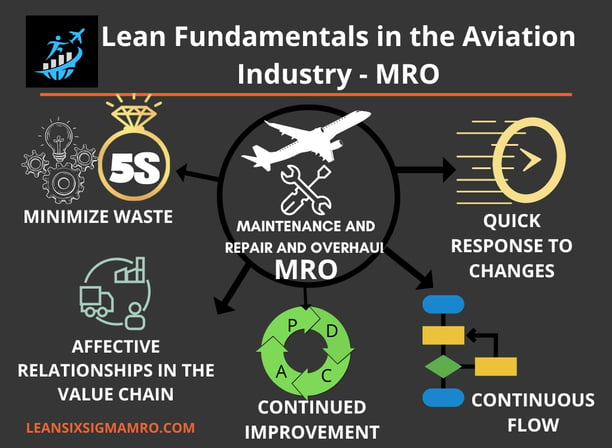Lean Fundamentals in the Aviation Industry - MRO
A Comprehensive Vision At the forefront of innovation and technology, the aviation industry has always sought to optimize its operations to ensure safety, efficiency and customer satisfaction. Against this backdrop, Lean principles have emerged as a transformative approach, revolutionizing the way aircraft maintenance, repair and overhaul (MRO) companies operate around the world. do blog.
CONCEPTS
3/26/20245 min read
Introduction: Lean in the Aviation MRO Industry
Overview
A Comprehensive Vision
At the forefront of innovation and technology, the aviation industry has always sought to optimize its operations to ensure safety, efficiency and customer satisfaction. Against this backdrop, Lean principles have emerged as a transformative approach, revolutionizing the way aircraft maintenance, repair and overhaul (MRO) companies operate around the world.
Exploring the Fundamentals of Lean in Aviation
Before we dive into the details, it is critical to understand the broad context of the aviation industry and how Lean principles have shaped its evolution. With a growing demand for air services, companies face complex challenges, from efficiently maintaining aircraft to managing globalized supply chains. In this context, Lean principles offer a structured approach to identify and eliminate waste, optimize processes and drive operational excellence.
Types of MRO in Aviation:
1. Maintenance of Aircraft Structures (Airframe): This aspect of MRO covers the maintenance and repair of the physical structure of the aircraft, including its fuselage, wings, stabilizers and landing gear systems. Essential to ensuring the structural integrity and safety of aircraft, airframe maintenance involves rigorous inspections, damage repairs and replacement of worn components.
2. Engine Maintenance: Engines represent a vital part of aircraft and require specialized maintenance to ensure their performance and safety.Engine MRO involves a variety of activities, from regular inspections to component repairs and overhauls, aimed at maximizing efficiency and extending the life of engines.
3. Component Maintenance: This category of MRO focuses on the maintenance and repair of individual aircraft components, such as electrical, hydraulic, fuel and communication systems. With the increasing complexity of systems on board aircraft, component maintenance plays a crucial role in ensuring aircraft operability and safety.
4. Line Maintenance: Line MRO refers to maintenance services carried out during regular aircraft layovers. These rapid interventions aim to resolve immediate problems, perform basic inspections and ensure that aircraft are in a condition to fly safely before resuming operations.
This is just a glimpse of the many facets of MRO in aviation, each playing a crucial role in maintaining the safety, reliability and efficiency of airline operations. In the next segment, we will explore the different geographies of this dynamic market and its impact on the aviation industry.


The Geography of the Aviation MRO Market:
The commercial aircraft Maintenance, Repair and Overhaul (MRO) market is globally distributed, with different regions playing distinct roles and influencing the dynamics of the aviation industry.
North America: Ranks as one of the most prominent regions in the MRO market due to the presence of a wide range of airlines and commercial aircraft operators. With a highly developed infrastructure and significant demand for maintenance and repair services, this region continues to be a key hub for the global aviation sector.
Europe: Stands out as a crucial destination for MRO services, home to countries with a consolidated aerospace industry and a demanding customer base. With advanced facilities and rigorous quality standards, countries such as the United Kingdom, France and Germany play a central role in providing maintenance and repair services for commercial aircraft across the region.
Asia-Pacific: Region is emerging as one of the fastest growing areas in the MRO market due to the significant increase in air traffic and the expansion of commercial aviation operations. Countries like China and India are leading this growth, driving demand for maintenance and repair services as aviation becomes an increasingly integrated part of everyday life in the region.
Latin America: Offers promising growth opportunities for the MRO market, with a developing aerospace industry and growing demand for maintenance and repair services. Countries such as Brazil and Mexico are investing in infrastructure and technology to meet the growing demand for aviation services in the region.
Middle East and Africa: Is witnessing significant growth in the MRO market, driven by the development of air hubs and increasing air traffic in the region. Countries such as the United Arab Emirates and South Africa are leading this growth, consolidating their positions as important maintenance and repair service centers for commercial aircraft.
These diverse regions contribute to the richness and complexity of the global aviation MRO market, each offering its own set of opportunities and challenges for companies and industry professionals.
Fundamental Principles of Lean Operations in Aviation:
The principles of Lean Operations are fundamental to achieving operational excellence and obtaining superior results in terms of quality, cost, delivery and customer satisfaction. In the aviation industry, these principles are applied to optimize maintenance, production and operations processes, ensuring efficiency and safety at all stages.
Waste Minimization: This principle seeks to identify and eliminate all activities that do not add value to the process. In aviation, this may involve reducing excess spare parts inventories, eliminating unnecessary movement during aircraft maintenance, and optimizing inspection processes to avoid rework.
Quick Response to Changes: Valuing flexibility and adaptability, this principle seeks to reduce response time to meet customer demands efficiently. In aviation, this may mean implementing flexible production systems that allow rapid adaptation to changes in demand for maintenance services or the availability of spare parts.
Continuous Flow: Seeks to establish a workflow without interruptions, eliminating bottlenecks and waste. In the aviation industry, this may involve optimizing the layout of maintenance hangars to minimize movement and waiting times between steps in the aircraft repair process.
Effective Relationships in the Value Chain: Emphasizes the importance of establishing trusting and collaborative partnerships with suppliers and business partners. In aviation, this could mean sharing information between airlines and MRO companies to ensure efficient supply chain management and rapid response to operational emergencies.
Continuous Improvement: Promotes a culture of constant search for process improvements. In the aviation industry, this may involve implementing training and qualification programs for employees, encouraging them to identify opportunities for improvement and implement solutions to increase the efficiency and quality of aircraft maintenance and repair services.
These Lean Operations principles, when applied in an integrated and systematic way, can generate significant benefits for the aviation industry, increasing operational efficiency, reducing costs and improving the quality and safety of the services provided.


Conclusion:
In short, Lean in the aviation industry is more than a simple management methodology; is a philosophy that seeks to fundamentally transform the way companies operate, focusing on eliminating waste, continuous improvement and creating value for customers. By applying the principles of Lean Operations in a way adapted and contextualized to the reality of aviation, companies can obtain significant gains in efficiency, quality and customer satisfaction, contributing to a safer, more sustainable and competitive aerospace sector.
This article highlights the importance of Lean in the aviation industry, from aircraft maintenance to component production, highlighting how Lean principles can be applied effectively to face the challenges and take advantage of opportunities in this dynamic and complex sector. With a customer-centric, results-oriented approach, Lean continues to play a vital role in transforming and continually improving the aviation industry, propelling it toward new heights of operational excellence and sustainable success.

With our Courses we promise to open the doors to a new era of possibilities. Advance to the next level with our Aviation Lean Course.
Are you ready to take a leap in your career in the Aviation industry?


Discounts
Only Here!!








